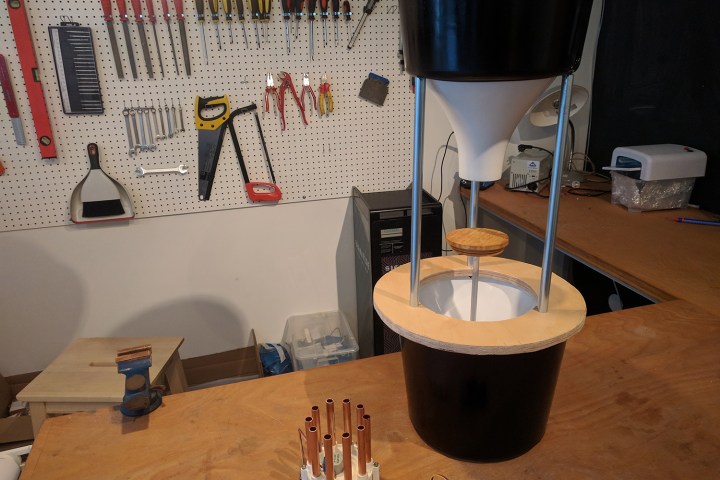
But a team of Dutch designers have devised a clever way to clean up our shared space by enlisting an unlikely ally: crows.
Crows are incredibly intelligent. Despite thumb-sized brains, they’re sophisticated thinkers and tinkerers, fastening rods out of sticks to “fish” insects and larvae out of tree bark. They’re also some of the best problem solvers in the animal kingdom. In one study, a crow named 007 successfully completed an eight-step puzzle for a food reward, and did so without any of Bond’s gadgets.
With all those smarts, crows are highly trainable, which is why the Dutch team decided to focus on these feathered friends as the clean up crew. In the project, called Crowded Cities, designers Ruben van der Vleuten and Bob Spikman have set out to develop the Crowbar, a device that provides mutual benefit for humans, crows, and the environment at large.
Van der Vleuten and Spikman didn’t initially consider crows. Rather, they spotted a problem — the billions of cigarette filters littered annually in the Netherlands alone — and searched for a solution.
First, they’ll need to learn that depositing a butt means receiving a reward.
“As industrial designers, we discussed using a Roomba-like vacuum cleaner that could drive around a city to suck up all cigarette filters laying around,” Van der Vleuten told Digital Trends. “Soon we realized this would be very complex and would again pollute the environment because of the production of these machines. So we started looking at how we can use the environment itself. This is where we saw the opportunity to use pigeons but doing research online showed that there is another bird around cities which is far smarter.”
The guys at Crowded Cities haven’t run any trials with the Crowbar yet but they’re pretty sure they know how it will work. The device consists of an inverted cone with a camera. When a crow deposits a filter into the cone, the camera quickly scans the offering and delivers a tasty treat.
Of course, crows probably won’t drop filters into the device on a whim, so they’ll first need to learn that depositing a butt means receiving a reward.

An American hacker named Joshua Klein might have an idea. In his own study, Klein has trained captive crows to deposit coins for a peanut and he’s now looking for citizen scientists to help experiment with wild crows. The Crowded Cities team have looked to Klein for inspiration.
There are some apparent problems with the Crowbar though, not least being the health of the clean up crew. Cigarettes and their filters are full of harmful chemicals and plastic fibers that might seep into a crow’s system. If crows handle cigarettes, how might this affect their health?
And no one really know how an incentive program like the Crowbar would disrupt crow communities. Would crows begin to congregate around smokers, nabbing half-finished cigarettes from their unsuspecting fingers? Would crows change their diets, trading insects and seeds for filters and rewards? If Crowbars suddenly run out of treats, will crows react like Szechuan sauce-deprived Rick and Morty fans? No one really knows.
Van der Vleuten and Spikman say they’re aware of the issues and want to meet with a specialist to discuss the concerns. Until then they’ll continue setting up their first trials and hopefully soon will help make the world filter litter free, one crow at a time.


